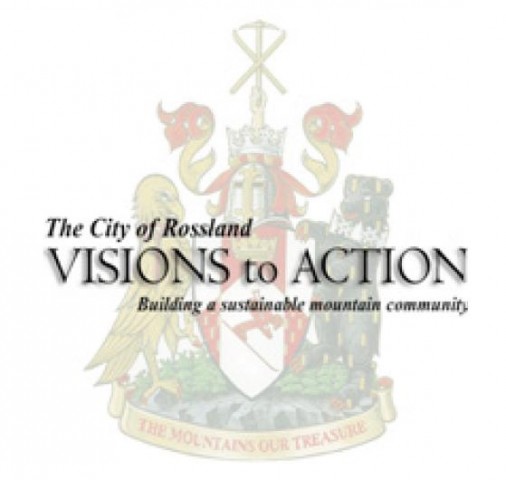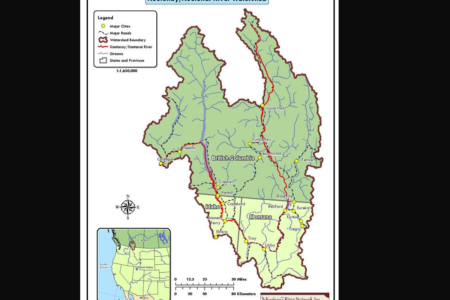How're we doing on climate change preparation?
Mega-forest fires, torrential flooding rain, scorching heat, drought and food shortages. Sound like an end-of-the-world style horror film? Maybe. But these things could also be looming in Rossland’s future should climate change continue to have its way. For most, dramatic climate change is no longer a matter of if, but when. In light of this, for the last year the Strategic Sustainability Commission (SC) has been trying to figure out what challenges Rossland might face due to climate change—and how to deal with them.
With the fall season now upon us, a renewed commitment to the Sustainability Commission from City Council, and a new commission manager on board, the SC is looking towards bigger and more public things ahead.
“It’s exciting times. We’ve just hired Lea Thuo as our new manager. This grows our ability to get things done,” said Sustainability Commission chairman Terry Miller. “We’ve accomplished a lot with volunteer efforts and work by Jennifer and various projects on the go, but we’re excited about the coming fall and winter to put Lea to work and drive our project further. She’s got a lot of experience, enthusiasm and qualifications and skill sets that work for us. She’s going to be great.”
Currently the SC is working on two major projects; Climate Change Adaptation project and the State of Rossland project.
At this past Monday’s SC meeting, the steering committee for the Climate Change Adaptation Plan (CCAP) approved the final plan. “Rossland actually has a bit of a road map and some data and some action items to help us to think through climate change and all of its implications now,” noted Miller.
The CCAP has been all about looking at what climate change means specifically to Rossland, painting a picture about what that looks like and suggesting to council some plans to mitigate future climate change related damage and to be prepared sooner than later.
Addressing four specific areas around climate change, the CCAP looked at climate change impact on infrastructure, water, energy and food.
Using infrastructure as an example, the report outlines some of the effects on each of these areas, such as greater demands in sharp periods. Questions such as, ‘would our sewer system be able to handle big weather events, how would our infrastructure fair in extreme wildfires, extreme wind storms?’ and the like were asked.
“The plans want to make sure [council] builds process , that they consider what these climate change items will be, and look at design guidelines for new buildings to reduce risks from overheating, flooding, fire and extreme event damage, and try to redesign rain water runoff so that we are capturing more of the water instead of letting it run down the pipes into the river. That’s just a highlight of the anecdotes around infrastructure,” explained Miller.
Validating some of the current initiatives in town, the plan also outlines some preparatory actions that currently exist or are just getting underway.
“On the food item, there was a lot of excitement here. Of course, Rossland has great things happening with the REAL food group, so this plan is looking at how climate change would affect our local food supply. For example, what if all of a sudden California couldn’t ship their lettuce to us? So promotion of local food production and processing and helping local growers and community composting is one of the suggestions in the plan. Things like that,” added Miller.
With the plan now complete, the group has also noted that the assumptions they used around climate change are now largely considered very conservative in terms of how much and how fast our climate is changing.
“The whole report is underpinned by the notion that this is a best case scenario and in fact as a community we may be facing some more drastic challenges in the years ahead,” continued Miller. “If you’re planning to put out a fire and all you are planning for is a small fire and what actually hits you is a big fire, well, I guess there is always a danger in under or over-estimating the impact. In any case, this report talks about temperatures, for example, going up on average two degrees a century. Everybody, I think, is looking at that going, ‘this is pretty conservative’. We think it’s going to get a lot warmer and water and the other risks are going to be worse than predicted.”
The State of Rossland project is designed to essentially act as a report card for the city to measure our progress or lack of progress.
“When we talk about sustainability, it involves everything,” explained Miller. “The social fabric of our community, the economic viability of our community and the environmental health of our community. It’s one thing to talk about all of this good stuff and to make plans around it. It’s another to be able to say, ‘so how are we doing?’ Until you make a line in the sand that sets the benchmarks you are starting from, you’re just talking about it.”
This project, which is currently in the process of being finalized, has now done the initial steps of setting those benchmarks. To get there, the group first identified, pared down, and resubmitted a set of indicators it feels will best measure Rossland’s progress.
“The indicators are the way that the community, through a consultation process, identified a number of indicators that we will be tracking over the years. It may change a little as we move along and determine if these indicators are working or not,” added Miller. “It’s like the speedometer in your car. You need a gauge that says exactly how well you’re doing or how fast you are going in any one direction; that’s what this project is all about .”
Most of the data can be capturing empirically, through the census process every four years. Other data such as Rossland residents’ activity levels, type and frequency of walking, and so forth, are more difficult to gather and will be the subject of a survey to soon be developed and delivered to Rosslanders.
With the base data soon to be fully in place, Rossland will be able to look at real data results each year and see how we measure up against our goals. In turn, this data will help determine future planning decisions.
In addition to this forthcoming survey, you can expect to hear more from the Sustainability Commission in the coming months as the newly refocused and energized group look to increase their interaction with the public through educational and informative events currently being planned.


























